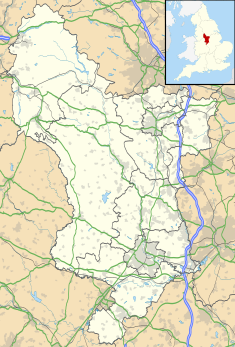Winster Market House
| Winster Market House | |
|---|---|
 The building in 2008 | |
| Location | Main Street, Winster |
| Coordinates | 53°08′30″N 1°38′25″W / 53.1416°N 1.6402°W |
| Built | Probably c.1570 |
| Architectural style(s) | Neoclassical style |
Listed Building – Grade II* | |
| Official name | The Market Hall |
| Designated | 29 September 1951 |
| Reference no. | 1245115 |
The Market House is a historic building in the Main Street in Winster, a town in Derbyshire, England. The building, which is currently in use a visitor exhibition centre, is a Grade II* listed building.[1]
History
[edit]The building was commissioned by the lord of the manor which, from 1570, was Gervase and Anthony Eyre of Newbold Manor.[2] It was designed in the neoclassical style, built in coursed stone and red brick and was completed in the 16th century.[3][4]
It was originally open on the ground floor, so that markets could be held, with an assembly hall on the first floor. The design involved a symmetrical main frontage of two bays facing north onto Main Street. There were short columns with imposts supporting stone arches on the ground floor, while the first floor was faced in brick, and fenestrated by cross-windows with stone surrounds. The end bays were similar in style except that the gables above contained oval-shaped oculi. Internally, the principal room was the assembly room on the first floor.[1]
Ownership of the building was passed down generations of the Eyre family until Anne Eyre married Clotworthy Skeffington, 1st Earl of Massereene in 1741.[5][6] It then passed down the Skeffington family until at least the early 19th century.[7]
The arches were infilled with coursed stone, probably in the first half of the 19th century, to encourage alternative use.[7] The use of the building for the sale of agricultural goods declined significantly in the wake of the Great Depression of British Agriculture in the late 19th century.[8] The building fell vacant and its condition deteriorated rapidly. During the late 19th century, it was acquired by Joseph Greatorex, owner of the Old Bowling Green Inn in East Bank, which was located just to the south of the market house.[9] Greatorex agreed to sell the market house to the National Trust, this being its first acquisition in Derbyshire, for £50, in 1906.[7]
The first floor was in a particularly poor condition, and it was restored to a design by William Weir, architect to the National Trust, using local labour under the supervision of Henry Rye, architect to Henry Manners, 8th Duke of Rutland.[7] The assembly room was subsequently fitted out with interpretation panels detailing the history of Winster and, in particular, its importance to the mining industry.[10] A scale model of the village was also constructed and included in the exhibition there.[11]
See also
[edit]References
[edit]- ^ a b Historic England. "The Market Hall (1245115)". National Heritage List for England. Retrieved 16 August 2024.
- ^ "Newbold Eyre Chapel". Derbyshire Heritage. Retrieved 16 August 2024.
- ^ "Winster Market Hall". Derbyshire County Council. Retrieved 16 August 2024.
- ^ "Winster Market Hall And Yeulgreave Fountain". Peak District Online. Retrieved 16 August 2024.
- ^ Lodge, John; Archdal, Mervyn (1789). The Peerage Of Ireland. Vol. 2. Moore. p. 388.
- ^ "Assignment of mortgage by the Rt Hon Ann, Countess Dowager of Massereene of Antrim, Ireland, only child, devisee and executrix of the late Henry Eyre, esquire of Rowter, Derbyshire". Derbyshire Record Office. Retrieved 16 August 2024.
- ^ a b c d "The history of Winster Market House". National Trust. Retrieved 15 August 2024.
- ^ Fletcher, T. W. (1973). 'The Great Depression of English Agriculture 1873-1896' in British Agriculture 1875-1914. London: Methuen. p. 31. ISBN 978-1136581182.
- ^ Greatorex, Joan. "The Name of Greatorex A History from Domesday to Millenium". Retrieved 15 August 2024.
- ^ "Winster Market House". Britain Express. Retrieved 15 August 2024.
- ^ "Winster Market House; Highlights". National Trust. Retrieved 15 August 2024.

